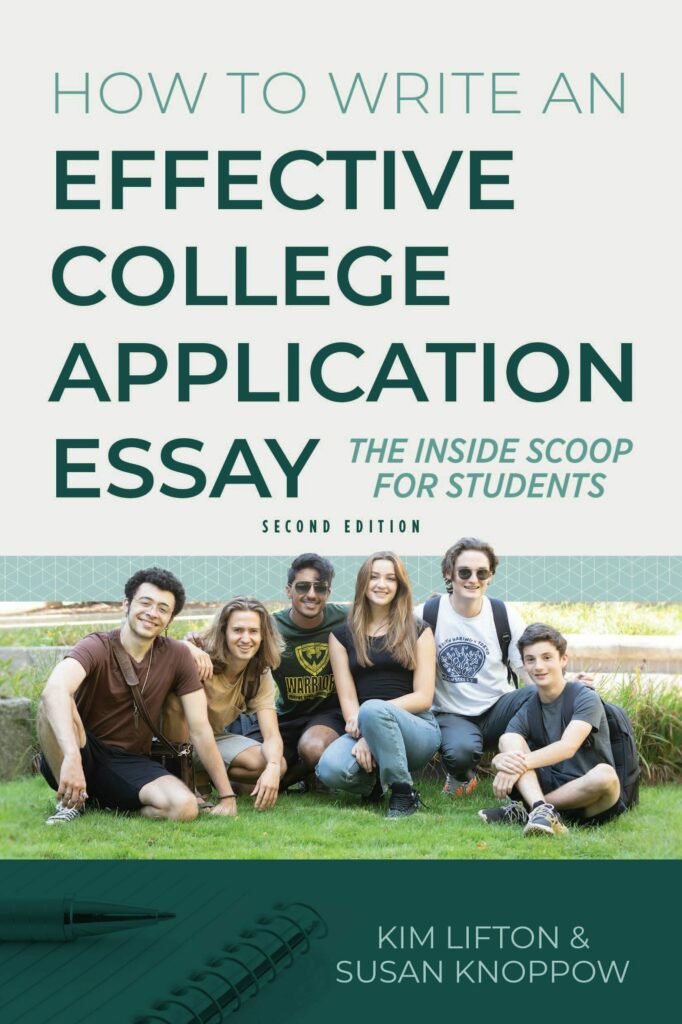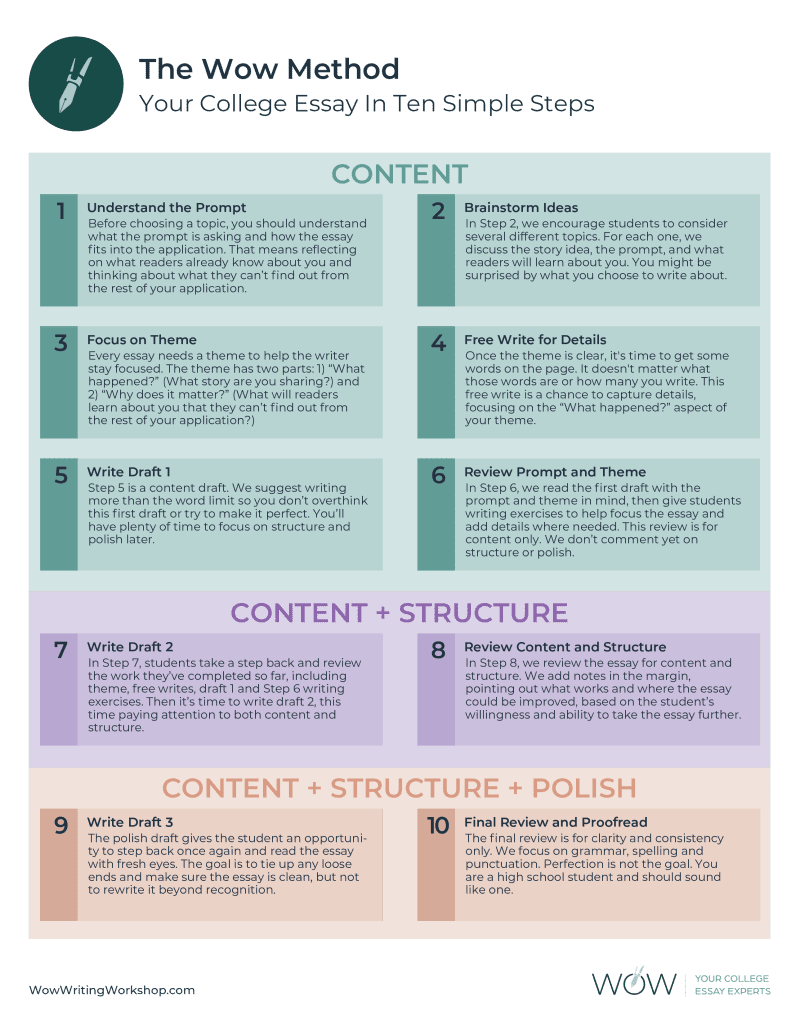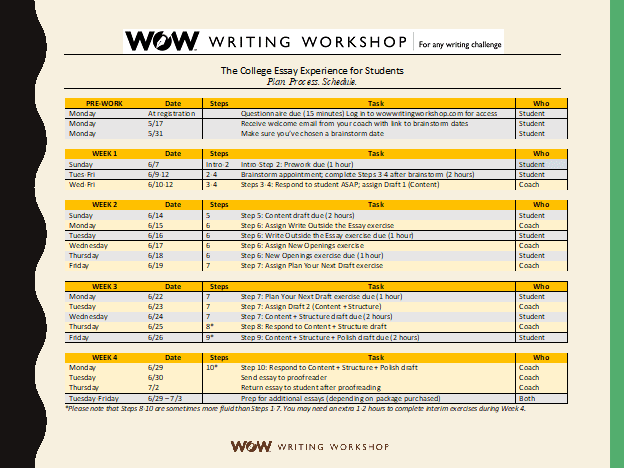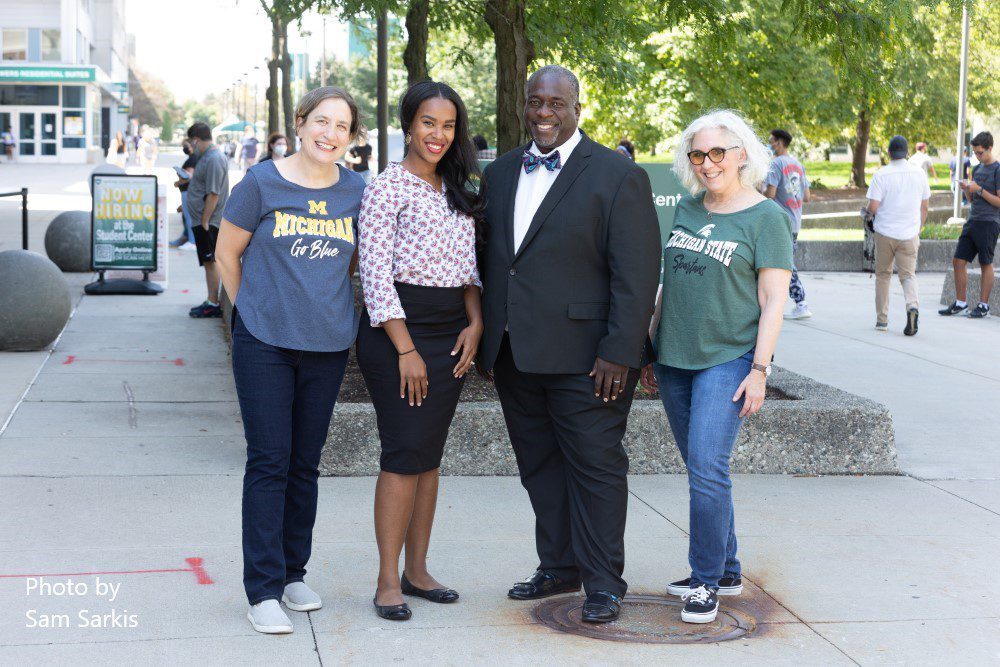
Table of Contents:
- How Important is the College Essay?
- The College Essay is a Thinking Task
- The First 4 Steps of the Wow Method in Detail
If you or one of your students is about to take the college application journey, I’m glad that you are reading this blog. I’ll provide some information about college essays, how to get started, and how we approach college essay writing from our many years of experience here at Wow.

Senior Writing Coach
We help a lot of students navigate the college essay process and we also train a lot of professionals. So, counselors or consultants in your area may have been trained in how to help people approach the essays using our strategies. Today, we’re going to dive in and we’ll talk a bit about what college essays are, how they function in the application, and you’ll get a preview into the first half of how we guide people through the essay writing process.
I’ve been with Wow Writing Workshops since 2013. In that time, I’ve worked with all kinds of students from, many states, many countries applying to many universities.
Diving right in: What is a college essay? Here we’ve got three things that we like to tell people when we’re introducing the idea of an essay: it’s your story, in your words, in your voice. If you’re applying to college, it’s very likely that you’re going to be required to write at least one essay. Usually, a personal statement is required, either the Common App essay, the Coalition Application, or a college’s own personal statement.
Often there will also be a number of supplemental essays, but if you are about to navigate applying for college it’s very likely that you’re going to have to write at least one if not a handful of essays. While this idea that an essay is your story seems pretty straightforward, we like to put this up here to emphasize that you are at the center of this writing task. When I say that the college essay is your story, I mean that it’s a chance for you to showcase something about who you are, and it should be something that you want to showcase about yourself.
It should be something that you want to share and is your story. You get to decide what you want to say. Right around the beginning of the college application journey, a lot of people are concerned about what they are supposed to do. What are you supposed to do to impress colleges? And you’ll get a lot of information from different people about what you’re supposed to do to navigate the college application system. Well, when it comes to the essay, the essay is really the human part so you’re going to let go of the “supposed to.”
We’re not starting the college essay with a predetermined structure in mind. The five-paragraph essay has a set structure from the beginning and tries to force the content to fit that structure. For college essays, the story determines the structure, not the other way around.

Now I will break down how to approach and start a college essay (hint: it’s not by writing a first draft!), how to choose a Common App essay prompt, and how Wow uses a tried-and-true schedule to keep students on track.
If you’re anxious about the college essay-writing process or don’t know where to begin, you’ll find everything you need in our book for families, How to Write an Effective College Application Essay, the Inside Scoop for Students.
Related:
- Is an A English Paper a College Essay?
- College Essay Q and A
- The Easiest Way to Write Your Personal Statement
This isn’t supposed to be a story, that is, something that a parent or a teacher tells you is the type of thing you’re supposed to write. This is your story and should be something that you want to express about yourself. Similarly, with it being in your words, it is very important that you are showcasing who you are not just in what you choose to write about, but in how you express yourself. It should be a genuine expression of how you sound. Admissions people want the essay to sound like it was written by a 17-year-old. So, writing in your words and using your own personal writing voice is just as important as you are being in charge of choosing what you write about.
As we go on, I’ll talk a little bit more about the steps that lead up to that choice. With Wow, we have a process that makes some of those decisions easier but we always have the choice of what to write about firmly in the author’s hands, in the student’s hands, because it’s supposed to be your story.
This is a question we get a lot: do essays really matter? There’s been a lot out in the news about how important essays are and now people will ask, well, how much do essays matter? Where are they ranked as far as, the most important parts of an application?
The short answer: Yes, the essay matters – perhaps now more than ever! So take it seriously.
Each school has its own way of deciding exactly who gets in and that’s a behind closed doors thing, but we do talk to admissions readers all around the country and they’ll give us big picture, what they’re looking at. So, I can’t give you an exact rubric of how they’re considering things, but we do know that the grades are the No. 1 number one thing most colleges consider. Grades are very important and not just what grade you get but what classes you take. We know that admissions readers do like to see that you’re challenging yourself and that you are getting good grades in challenging classes.
We cannot answer all your questions about everything that matters to admissions folks. But we can answer every question about the college essay!
How Important is the College Essay?
After grades, the next thing that would top that list has been test scores. Some schools are now test blind, meaning they don’t accept test scores, or test optional, meaning you can submit them if you want. The future of how important test scores are still seems a little uncertain, but I will say don’t let that fool you. Talk to your school counselor to find out how the schools on your list feel about tests before you decide to take them, or before you decide to submit the scores.
Tests are something that some of the more selective colleges still seem to take a close look at, and certainly something that they may consider when reviewing your application. The same holds true for the essay. Is the essay becoming a more important part of the application? Some say yes, some say no, others say maybe.

Whether it’s more important than it was five years ago, I don’t really think that even matters. The point is that they’re very important. They play a very important role in the application, and they show a side of you that no other part of your application can show. And it’s a personal human side. The rest of the application has a lot of great information about you, essential information that colleges want to see, but the essay is really where you get to be humanized and relate to someone on a personal level. And that’s been an important part of the application process for a long time and it’s still an important part.
And whether it’s more important than it was before… perhaps it is but regardless, sometimes people will get caught up on, how are we ranking? What’s the most important part of the application? And we’ll often stop people and say, the point is that these essays are required. And if they’re a required part of the application, you’re going to want to do as good a job on them as possible because if you’re going to set yourself apart in a competitive landscape, well, then you’re going to want to use every opportunity to make yourself stand out in a positive light.
If colleges are saying they’re absolutely wanting you to do these essays, then they’re going to want you to give your full effort and, do as good a job on them as you possibly you can. We know the entire college application process can feel very daunting and we’re focused on essays, but I know people have a lot of essays to write that feel like quite a daunting task as well.
The thing that we use that helps take that anxiety level down and helps the quality essays come to the forefront and get on the page is our process for students to follow. We make a plan and then we have a schedule that we’re able to stick to. And all of these things work together. So really the process is what allows us to make a plan and a schedule that we can follow. And the process is also really helpful with helping with that, worrying about, how’s the essay going to turn out? How am I going to stay on top of my tasks? Because it takes the essay writing task and breaks it down into smaller, more manageable pieces. Take a look at this graphic depiction of our ten steps.

Our PROCESS is our magic. The Wow Method is simple, with clear instructions to help you succeed. Your coach will help you build on your strengths and demonstrate your best qualities.From brainstorming ideas through multiple drafts and final proofreading, we PLAN out every task, so you can calmly write essays that will enhance your applications.
Most of our students apply to 4 or more schools, which means they have to write 10-15 essays. We use a proven SCHEDULE that will help you stay on track to meet your application deadlines
Look at our sample schedule below, and you’ll see that start to finish we’re really taking about three weeks for the personal statement. And I think that’s more or less what everyone falls into. People can go through the supplemental essays faster, but this is a schedule that we have found works well for us, especially once someone’s not used to writing college essays and you’re learning how to do it as we go.

The next important thing to talk about is trusting yourself. As I mentioned with managing time, a big part of, the thing that we’re managing is also stress and worry. And I know that this is a big task and it’s something that you care about because you care about where you’re going to go to school, but it’s important as you are telling your story, you can’t tell your story unless you trust yourself that you have a story to tell and your- what you have to say is valuable, right? So, one thing I’ll say to start that out is that you are ready. You already have all the experiences that you need in order to write an effective essay right now.
There’s no extra thing you need to go out and do before you’re ready to dive in and do your essay. And in fact, I think this is: Students really have the opposite problem. We have many lived experiences that showcase positive parts of ourselves. And, really when we get into the brainstorm, the trick is choosing just one. but the point is that there’s nothing extra that you need to do who go out and manufacture an experience. We often tell students it doesn’t matter if it’s a big or small experience. Ordinary everyday things can turn into wonderful essays as long as they showcase something positive about you
This is your journey. No person gets to where they are today in the same way. And two people could have had the exact same experience, been in the same room for the same club doing the same task, and they could have experienced that day in a very different way. They could have learned very different things from it. This is not meant to be an objective statement about, the value of what you’ve done, this is meant to be a subjective description of your personal journey, through life. We’re not going to capture your whole life, but just a small story that showcases something about you.
In case this sounds a little abstract, I wanted to share a story about a particular student that I had a few years ago. That student’s name was Deepak. When he came to us, he was concerned about whether he was going to be able to write the essay. Deepak was a future engineer. He loved engineering. He was very involved in robotics club, he went to engineering camps, and he thought like an engineer, he excelled at being an engineer. He loved math, he loved science, and that’s where he felt comfortable.
He certainly did not feel comfortable when he first came to us with expressing himself through writing. And he was worried that he wouldn’t be able to write well enough to do and excel in the essay the way he excelled at doing other things. And he was also concerned because writing structure didn’t make sense to him the way that other types of structures for STEM things made sense. and when he came to me and said, “I’m worried about this because I’m not a writer,” my first reaction was you don’t need to be a writer to do the college essay.
The College Essay is a Thinking Task
All you need to do is be a thinker because the essay starts as a thinking task. In fact, I would say it’s chiefly a thinking task. And I know that you can think, and all we’re going to do is take that great thinking ability, and we’re going to turn it toward yourself. So, once we started our conversation, he started talking about some of his different experiences. And he paused himself again because his confidence was a little shaky when we first started and he said, “Well, this is a meaningful experience, but I don’t know how to write about it.”

And I’d say, “Well, that’s all right, let’s just start by thinking about it. Let’s think through this experience and why it was meaningful to you.” And once he was able to think it through, all we had to do was get those thoughts on paper. And that takes a little patience but once you have the thoughts down, getting them on paper is a very doable thing. So, yeah, just keep in mind you already have everything you need. And as long as you can think and turn those thoughts toward yourself and think about who you are, you can successfully write an essay.
All right. So, what’s going to make you stand out? This is another thing that people ask us a lot. How am I going to rise to the top and catch people’s eye? And there are a few things that you can do that will definitely help. A big one is answering the question. I know that seems obvious, but you’d be surprised how many people, when they get to the finished essay, haven’t really answered the prompt that they said they were responding to.
The Common App essay prompts are very broad. They purposely leave room for you to interpret them in different ways because they want you to tell a story that’s meaningful to you.
They’re not trying to put you in a box; they’re trying to give you a springboard to jump off of, to tell a meaningful story. That being said, they still have a prompt that they’re asking you to answer. And if you turn in an essay that hasn’t answered the prompt or has perhaps missed one part of the prompt, well, that’s maybe a sign to the people reading that you’re not, someone who closely follows instructions. And so you definitely want to pay close attention to the prompt and fully answer the question.
We’ll take a look at one of the prompts and go through it together in just a few minutes. The other thing for how to stand out in a positive way is to make sure that you are writing the essay yourself from beginning to end.
I can’t stress that enough and I know that there are a lot of people who fall victim to well-intentioned adults who just want to help them polish up their words a little bit. I’ve certainly had experiences where a student will write an essay, and then a parent will say, “Oh, I took their essay, and I just made it sound a little bit nicer.” But then what happens? That essay ends up sounding like the parent.
Trust me, college admissions readers can tell the difference. When you have a stack of essays you’re reading through and one of them sounds like it was written by someone who, is already in their ’40s, it’s very clear. It sticks out like a sore thumb.
That’s the standing out you don’t it want to do and that could actually hurt your chances of admission. A big part of standing out is to write it to yourself and, like we said earlier, allow it to be in your own voice. Trust that your voice is important, and you can say invaluable things just using the words that you use every day.
The other thing is, keep it real.
Again, earlier we were talking about this idea of people being worried about what they’re supposed to write and keeping it real is about, well, telling an honest story about something that really happened and focusing on your true experiences. It’s also about answering: what things really interest you? What are the characteristics that you really find valuable? Don’t worry about forcing yourself into the box of what you think you’re supposed to write about. Stick to the real, what do you really care about and who really are you?
Then, be reflective. Getting to that idea of who are you gets into this quality of being reflective where it’s not just telling a story about what happened in an experience, but digging in and to why is that experience meaningful to you? What do you show about yourself when you describe that story and what positive characteristic are you going to let readers know about you? We use something we call the 10 steps. And this is a writing process that we developed, and we’ll work with all kinds of writers.
Related: Tips to Overcome College Essay Anxiety
No matter what type of program you’re applying to or whether you feel like you identify as a writer or not, this will certainly help you. And if you look at the big picture, the first six steps are all focused on content. What’s the story, what are the ideas that you are going to get into that story? And then the next couple of steps, take that content and work on structuring it in the most effective way possible. And then only in the very end do we start polishing, with language. One big thing to notice here is that structure and polish are only coming in in the last few steps.
This order is very important, and this order is a big part of what makes this writing process work so well. We’re not starting with a predetermined structure in mind, like the five-paragraph essay that has a set structure from the beginning and tries to force the content to fit that structure. That’s not what we’re doing here. Another example would be, well, there’s all kinds of different essay structures that I’ve heard people pitch as like this is a great type of essay for you to write to get into college. And they’ll start structure first and then they’ll try to get people to get their story to match up with the structure.
The structure isn’t the important part.
Admissions readers aren’t excited about seeing a particular structured essay, they’re excited about learning about you. It’s meant to be a personal thing. Remember earlier when we said that you were always at the center of this writing task. We always start with content and focus on that first. We’re thinking about what are you trying to communicate about yourself? And then when we get to structure, that structure is different for every essay.

We have some exercises in the 10-step process that specifically help find an effective structure, but what makes a good structure or a structure that works well really depends on the story you’re telling. The story determines the structure, not the other way around. And then, of course, it’s important to remember that polish is at the end. Sometimes people will be trying to polish as they go, especially if you’re used to only doing one draft of something and then doing maybe a couple of edits to the language for draft two and then turning it in.
Well, sometimes what happens when we’re polishing too much in the very beginning is that we don’t want to make big picture changes as we go. And, sometimes that’s for the best if we’re trying to rethink the content or the structure of that thing. We leave polish for the very end just knowing that there’s room for a lot of change as we move through several drafts and the essay develops. Then we do polish, so we never let anything go before it’s had a close proofread and everything is ready to present.
The First 4 Steps of the Wow Method in Detail
All right. Let’s go through together. I’m going to take you through the first 4 steps of the Wow writing process, the 10-step method. And then, at the end, like I said, we’re going to have our Q&A and I’m also going to, share with you how you can, get our book for free that will allow you to see the rest of the steps and get more detailed information about everything. and there it is. There’s our book about how to approach the college essay. At the end of this, I’ll give you a URL where you can download that for free.
Whether you decide to work one-on-one with one of our coaches or not, we would really love for everyone to have access to this book. One thing that’s very important to us is that everyone applying for college have good information about how to approach the essays, to know there’s a lot of competing information out there. And so this is just very meaningful to us that you have what you need in order to make informed choices about your application.
Step one is understanding the prompt. What’s the prompt asking? In order to know what the prompt’s asking you have to think about how the essay fits into the application. What are the people getting from the essay that they’re not getting from other parts of the application? Or another way to think about that is why would colleges require an essay to begin with? What do they find valuable in this? And a big part of this understanding how the essay fits into the application is asking yourself, well, what do readers already know about you? What are they going to learn from all of the other parts of the application?
And then after that, well, what does the essay do? What do you want people to know about you that they can’t learn from something else, that they can’t learn from your transcripts and your grades and your test scores and your activities list? So going back to my student from earlier, Deepak, Deepak struggled with this a little bit in the very beginning part of our writing process. He was very involved, like I said, in robotics and it was clear that that was something he wanted to explore in his essay.
And when he first started talking about it, he was telling me about all the competitions he went to, all the awards he won and I asked him, “Well, will those competitions and awards be listed somewhere else in the application?” He said, “Well, yeah, they will.” I was like, “Well, then we don’t need to write about them in the essay if people are already going to know about that.” And, he was still interested in exploring this idea of robotics, so I’m like, “Okay, well, we don’t need to write about something completely different,” but I asked him, “What don’t people know about you that they can learn about you through seeing you engage with this activity?” Once we talked a little bit more, it came down to, well, what do you contribute to the team? What part of your personality makes you good at this? And eventually, he talked about how he was a creative problem solver and we got down to an example of when he was creatively solving a problem.
On the surface it seemed very simple. It was just how to get two hoses to fit together. They were long hoses, and they didn’t fit together very easily. And he went through talking about a lot of different ways that he tried to get them to fit together and some of the out-of-box thinking he eventually did to make it work. So that’s something that showcased his creative problem-solving. And that’s not something that people immediately could know from seeing that he was involved in robotics, they would know that he spent his time doing that.
They could probably guess that he enjoyed robotics, but they didn’t know what made him good at it, or what part of his personality was making him an asset to that team. So now they’re going to remember that he’s a creative problem solver, and that’s going to inform the way they look at the rest of his application, too. So step one is understanding the prompt and it’s all getting down to this idea of how can you communicate something positive about yourself that people aren’t going to know from the rest of your application?
Let’s take a look at example of a prompt here. Let’s take a look at Common App essay prompt 1. And let’s just take a look at what the words are and dig into what are they asking for. It says some students have a background, identity, interest, or talent that is so meaningful they believe their application will be incomplete without it. If this sounds like you, then please share your story. So, what are the keywords? The first big keyword we’re seeing here is meaningful.
That’s not starting with, “What do admissions people want me to say?” It’s starting with saying “What’s meaningful to you?” So, with these things that they’re mentioning an identity and interest or talent, well, people would say, “Well, should I write about a particular talent? Should I write about a particular interest?” And my question is, is that talent or interest meaningful to you? And if it’s meaningful to you, then maybe that’d be something you want to explore in your essay.
Related: Cornell Admissions Exec Says Don’t Try to Be Unique in College Essay
And then also it re-emphasizes something that we’ve been talking about for our whole chat so far, is that it should sound like you, right? So, there are a lot of different options you could choose for prompts to write about for the Common App essay. And right here, they’re reiterating that if you’re going to choose this prompt, they want it to be something you choose because this sounds like you. They’re not trying to say that you need to force your essay to fit into this prompt. You could choose a different one. They are just giving you this opportunity and if this one sets off that little ringer in your mind, like, “Oh, I see myself in that,” that’s when they want you to write about it.
Step 2: Brainstorming ideas
Let’s look at Step two, brainstorming ideas. This is process isn’t just a conversation. I mean, we do have a brainstorm conversation with students, but brainstorming ideas involves taking some time on your own to think about different experiences you’ve had and make some notes about those experiences. There are lots of different ways that you could approach this. You could have a conversation with a friend or a family member and ask them about what, what they think some of your positive characteristics are.
Ask people about why they value their friendship with you, and that can lead to some realization of characteristics. But make sure that you’re always the one in charge of deciding what story you want to go with. You might have conversations with other people just to get your wheels turning to help you look at yourself in a reflective way, but always go to, we’ve said before, always go with what’s meaningful to you, when you’re deciding on the prompt, not just what’s meaningful to someone else. It should be something you want to express about yourself.
When we have students prepare for our brainstorm chat, we like to ask people to just get a couple of ideas on paper, or a few ideas. And it’s always good to at least jot down a few different potential ideas because comparing them will help you get a better understanding of what you want to say about yourself and a better understanding of whichever idea you eventually choose. And as you’re jotting down notes, be specific and try to capture at least a few specific details for each idea. Think about details, a big picture, what happened, in the overarching thing of your story, but also very specific, physical details. Where were you? What were you doing? What was happening around you?
In our book for students, we have an example of teaching Ellie to swim. And this was an example from a student essay from many years who worked at a pool and gave swim lessons. And they had this young girl, Ellie, who, was taking swim lessons all summer and was struggling because she was afraid to put her face in the water. And, week after week, Ellie’s coming to the pool, having a hard time putting her face in the water and the student writing the essay was trying all kinds of different ways to, approach teaching Ellie how to swim and being patient.
Patience and finding creative solutions were an important part of that story. They wrote down a few details in this stage, maybe four or five sentences for their step two idea for teaching Ellie to swim and it captured where they were. They were at the pool. What were they doing? They were working with Ellie, and then they particularly remembered the day that Ellie finally did put her face in the water and swim from end to end. And they jotted down a few very specific details about that place in time, so it was overcast that day. there weren’t many people at the pool, and they didn’t have to launch into writing the whole essay at this stage, but jotting down just a few specific details, really helps you take yourself to that moment in time when you’re looking at this idea later.
Next, Step three is focus on theme. We always say that a personal statement at its heart has a theme with two parts: what happened and why does it matter? “What happened?” is asking, what’s the story you’re going to tell? What’s the moment that you’re going to share with your readers? And “Why it matters?” is asking, why does it matter to the admissions reader? What’s the positive characteristic that they are going to learn about you when they read this essay? We put focusing on theme very early in the writing process on purpose; this is one of the most important steps of the entire writing process.
Focusing on the theme early gives a sense of clarity. You get some clarity about what you want to say about yourself and what story you’re going to tell in order to communicate that. And having that clarity early on makes all of the parts of the writing process that come later a lot easier. Writing your first draft, revising your draft, finding an effective structure, all of those things are easier if you have clarity about what you want to communicate about yourself.
And then Step four is a free-write. We ask everyone do a free-writing activity before diving into the first draft. It helps make approaching the first draft a bit easier. At this point, you’ve already decided what story you’re to going to tell. You’ve already decided what you’re trying to communicate about yourself through that story. And now it’s just a chance to tap into that memory and gather some details outside of the pressure of writing a structured draft.
This free-write has no structure. You are able to write whatever comes to mind when you’re thinking about that story. Taking that little bit of pressure off, of not worrying about structure at all, allows some of those details that are lodged in the back of your mind to float to the surface and make it to the page. So those are the first four steps of the Wow 10-step method.
Download your free copy of our book here.
Related: What’s the Biggest Mistake Students Make in College Essays?
And what if that person says that they like music? You don’t think to yourself, “Oh, you like music? Well, get out of here. I don’t want to hear anything else about you because everyone likes music. How cliché is that?” No. You think to yourself, well, what bands do you like? What shows do you go to? I like music. I can really relate to someone on that level.” So, when you’re engaging with someone for the first time, you’re not concerned about them being unique. You just want to get to know them.
You’re keeping an open mind and waiting to hear what they tell you. That same idea can be applied to choosing which personality trait or which characteristic to write about. We’ve talked to many admissions readers, and they’ve said many times that they don’t have a list of favorite characteristics that they’re looking for. And I think of that meeting someone for the first-time analogy can work for that too.
When you’re meeting someone for the first time you don’t think to yourself, well, I’ve got three friends who are leaders, so this person had better be a good listener or else we can’t be friends because I only have a slot for good listeners. No, you wait to hear what they have to tell you and you want to discover something about them. You’re going to discover whatever it is they’re willing to share.
And that’s the same way that admissions reader approach reading the essay. As long as you’re communicating something positive about yourself, that’s going to be giving them what they want. All right. It looks like our time is up.
You can download your free copy of our book here.



